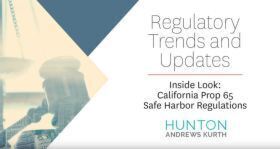
Overview
Hunton represents clients on all aspects of California’s Proposition 65 (Prop 65). For over 30 years, our attorneys have effectively and successfully represented trade groups and businesses, throughout the chain of commerce, on Prop 65 compliance, defense of claims, and rulemaking issues. Our team includes technical expertise in toxicology and public health, allowing us to dig deeply into claims and rulemakings that have scientific underpinnings. We help clients navigate matters alleging product, environmental, and/or workplace exposures as well as alleged non-compliant discharges to groundwater.
Our team develops client-specific compliance strategies to proactively identify potential liabilities and provide robust solutions aligned with our client’s business objectives. With substantive experience in the law, and in close coordination with our client’s needs and goals, our attorneys are prepared to advise companies that receive a Prop 65 Notice of Violation (whether from the Attorney General or a private party) and to swiftly develop efficient Prop 65 defense and resolution strategies.
What is Proposition 65?
California voters approved the Safe Drinking Water and Toxic Enforcement Act in 1986 (Prop 65). It is one of the most stringent chemical regulations in the country, which impacts all consumer products sold, offered for sale, or distributed in California. Its reach is truly global.
Prop 65 typically is enforced by the California Attorney General’s Office or private parties, including self-proclaimed environmental groups. The law requires businesses to provide warning labels on products warning of even low exposures to any of the more than 900 listed chemicals known to the State of California to cause cancer, birth defects, or other reproductive harm. The intent of Prop 65 was to allow Californians to make informed decisions concerning potential chemical exposures. It has, however, built in incentives for private parties to allege claims even where exposures requiring a warning have not occurred (and even where the business may have test reports demonstrating actionable exposures are not occurring).
The Office of Environmental Health Hazard Assessment (OEHHA), a part of the California Environmental Protection Agency (CalEPA), implements (but does not enforce) Prop 65. OEHHA decides whether chemicals meet the requirements for placement on the Prop 65 list and updates this list of chemicals, by law, once a year. OEHHA also determines the regulations governing required warnings.
Brochures
- Proposition 65 Brochure
- REACH – Complying with the EU’s Wide-Ranging Product Regulation for Chemical Risk
- California Environmental, Natural Resources, and Climate Change Brochure
Featured Insights

New California Proposition 65 Warning Regulations for Hotels: From Check-In to Check-Out
California Hotel & Lodging Association webinar presentation

OEHHA’s Proposed Warning Regulations
IPC 2015 presentation by Malcolm Weiss

Proposition 65 Executive Briefing PowerPoint

COVID-19: AG Requests ‘Cooperation’ in Enforcing New Claims

VIDEO Inside Look: California Prop 65

VIDEO Inside Look: California Prop 65 Safe Harbor Regulations
Experience
Hunton attorneys have advised clients on Prop 65 issues since the initiative was adopted. We advise industrial, manufacturing, trade groups, and other business clients whose facilities, retail locations, or products have been targeted as a result of the initiative.
Representative Matters
- Representing clients in matters alleging product, environmental, and workplace exposures. This includes the sales of consumer products, including tools, footwear, furniture, cosmetics and beauty products, toys, jewelry, china, crystal, computer products, automotive parts, BBQs, and food and beverages (including herbal supplements). In short, pretty much any consumer product you can think of that has been the subject of a claim.
- Representing major California hospitality and apartment associations with Prop 65 defense and compliance issues.
- Representing Fortune 100 companies and medium, small, and “mom and pop” companies.
Reported Decisions
- Warning Decision: Consumer Advocacy Group, Inc. v. Kintetsu Enterprises of America, 141 Cal. App. 4th 46 (2006)
- Warning Decision: Consumer Def. Group v. Rental Hous. Indus. Members, 137 Cal. App. 4th 1185 (2006)
- Insurance Decision: Ultra Salon, Cosmetics & Fragrance, Inc. v. Travelers Property Casualty Co. (Cal. App. 4th Dist., June 10, 2011)
Insights
Legal Updates
Events
Publications
Blog Posts
News
Contacts


Navigating the Safe Drinking Water and Toxic Enforcement Act of 1986



Highlights
- 2 Minute ReadNews
- 14 Minute ReadNews
- 6 Minute ReadNews

